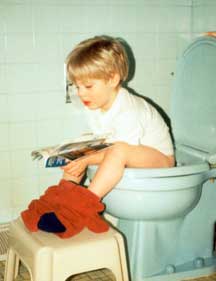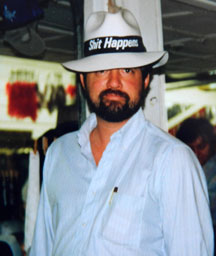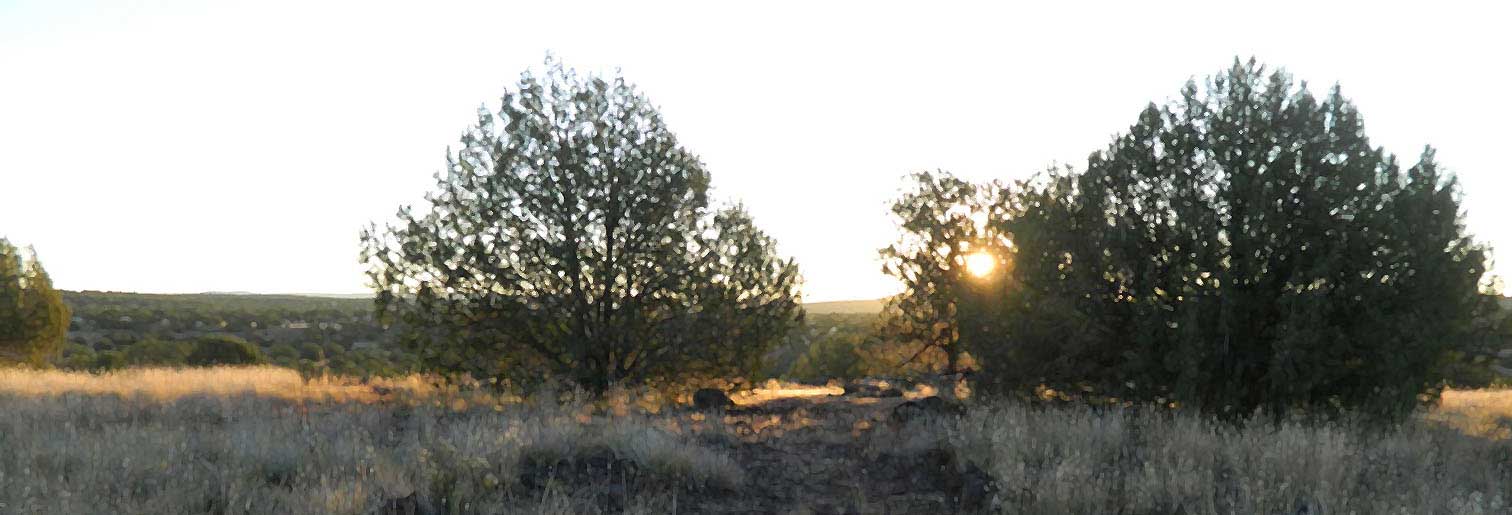
A LITTLE BIT
OUT THERE
THIS PAGE is extracted from a short book I published a few years ago, a collection of recollections, reflections and personal experiences, humorous and otherwise.
The title originated from a conversation I had with my eldest son a few years back. A widower late in life, I remarried and my two young adult sons acquired a stepmother. Soon I noticed that when they called home, they most often called my wife instead of me. When I asked my oldest son why that was, he responded, “No offense dad, but you can be a little out there.” He went on to say his stepmother, Wendy, was more down to earth and more able to answer his more practical and straightforward questions without drifting off topic or launching into a story he had heard countless times before. Thinking about this, I realized he was right.

ONE OF MY EARLIEST memories was a day in Nursery School, a precursor of today’s pre-school venues, when I was four-years old. I felt ill, so as one of the teachers waited for my dad to come pick me up, she gave me a Lifesaver Candy. Little things like this stick in a child’s mind in distorted ways. For several years, I thought them to be some sort of mild medicine much like Rolaids or TUMS. When my grandmother gave me a Lifesavers book of candy one Christmas I finally realized what they really were.
KID-TO-KID is a franchise store that specializes in used children’s clothing. I reminds me however, of the way kids communicate on a level adults rarely understand. My parents tried in vain many times to explain to me how to tie my shoes. I entered Kindergarten still unable to do so. Of course, on the first day they came untied. Completely unglued, I sat on the verge of tears until another boy in the class showed me how easy it was. He explained it in what I call “kid speak.” That is the cryptic language adults don’t understand but makes perfect sense to children. Adults hear babble, mispronunciations and simplistic sentences. Kids hear articulate sophisticated discourse between themselves.
The boy mentioned above, Paul, and I became inseparable pals over the course of the following fifteen years. We remained in contact with each other until he recently fell critically ill and died He will figure prominently in some of the following stories.
SIBLINGS SOMETIMES add their own challenges to childhood. My older brother, eight years my senior, was what was once called, a “latch key kid,” which meant when parents were away at work, he or she was the caretaker of the younger kids. In my case, he only had to watch out for me as well as himself. Weekends were particularly difficult as both our parents worked. Cereal was our main menu item and one my brother didn’t have to cook. It did however require milk, which was frequently in short supply. Our father always left money for this in case we ran short. There was a nearby road stand where it was available but one of us had to fetch it. A toss of a coin would determine who would do the fetching, often doing so knee-deep in snow.
Brother would toss the coin with the statement, “Heads, I win, tails you lose.” Dear reader, in case you missed it, this meant I did the fetching, at least until I wised up sometime later on. Then he simply said, “You go.”
MANY YEARS LATER, I pulled this ploy on a young man working in a pawnshop while dickering over the cost of purchase. He wanted to examine the coin, which he found to be satisfactory, but before he had too much time to think about it, I flipped the coin. Of course, I won. His puzzled look told me he knew that somehow he had been cheated, but couldn’t figure out how. Finally, unable to contain my laughter, I explained and agreed to split our difference on the price.
THE ABOVE AND OTHER FORMS OF TEASING and practical jokes notwithstanding, my brother paid the price often as my babysitter. Snow blowers were yet to be common. Many teens, including my brother made good but hard-earned dollars shoveling driveways in the winter. My brother was on just that type of job, but five year-old little brother had to tag along for obvious reasons. He of course, was busy with his labor, but with nothing to do, I stood around freezing. Repeated requests to allow me to stand in the foyer or garage because of the cold refused by the homeowner. Halfway through the driveway, he had to quit or see me get frostbite. He was not paid, but I was grateful.
BEFORE THE DAYS of computer, on-line or console games, we spent countless hours tramping around in the woods and creeks. One March day, when we were still in elementary school, I was standing on the edge of a creek looking across. Paul pushed me in from behind. As I stood, water up to my knees and glaring at him – he jumped in. When I asked him why, he responded, “you looked so pissed-off, I figured you were going to push me in. I thought probably it would be head-first. This way I won’t get so wet.”
Some years later, I told this story to my young son who was of the same age I was when I met Paul. When he asked to hear more stories, I realized that this was the only safe one to tell him – all the others had some form of mischief. The mischief included, what today, would be considered petite larceny, vandalism, reckless endangerment or criminal use of minor explosive devices. They won’t be told here either.
PARENTS HAD IT MUCH EASIER when I was a kid. “Go out side and play. Be back before dark. Do your homework.” That was it for the most part. They weren’t taxi drivers, baby sitters, teachers, playmates and social directors. As long as you didn’t screw up too much life was good.
***
OUR SCHOOLS WERE DIFFERENT.
Our teachers, and coaches, love ‘em or hate ‘em, commanded our respect, and we gave it to them. If we screwed up there was discipline. If we did well, they would go the extra mile and helped us to do likewise. The focus was on a wide education, from math, history, science and language to art, typing, music, shop and home economics - even the boys in later years. There was even a strange course called “Cit-Ed” (Citizens Education). Teachers often went above and beyond, the call of their jobs with clubs and sports. Clubs and extra curricular activities flourished. The variety of options was endless. The class of 1972 even formed a gun club. Can you imagine that today? Our teachers dressed like teachers and we dressed like…
OUR CLOTHING AND HAIR STYLES would look outlandish today, often a mix of conservative button down collar shirts, tie-dye and bellbottoms. Love beads, chokers and headbands were in vogue. Long hair, crew cuts, flat tops, afros and Mohawks all saw their day in our day.
SOME TEACHERS had no clue about best friends if they happen to be boys. Mrs. Tweedie (yes, her real name) was one of those teachers. One day in the 4th grade, Paul and I were fighting on the playground when recess ended. She said, “Just go on fighting. The class is going back inside.” - We did. A few minutes later, she came back out and shouted, “What are you doing?” While still fighting and rolling in the dirt we replied, “Just what you said to do.” What she and most other adults didn’t understand that best pals often fought more with each other than they did with their enemies.
SOME TEACHERS understood boys. Mr. Nicholas was one of them. Like most male teachers of the day, he didn’t rely on sending kids to the vice-principal if they misbehaved. Male teachers generally took care of discipline issues personally. In this case, I was being needlessly and trivially argumentative one day in his 6th grade class. When I told him that he didn’t know what he was talking about, he simply pointed to the door and advised me to wait for him in the hall. I did so promptly and awaited death – or worse. A few minutes later, he came out into the hall and facing me directly, grasped me by the shoulders and firmly banged me into the lockers. He finished by saying, “I never want you to speak like that to me again – understood?”
I not only understood, but respected him even more. In junior high school we had a day off that the elementary schools didn’t. Several of us visited Mr. Nicholas, our favorite teacher.
No doubt in today’s world, he would have been fired or tossed in jail, which would be a travesty. I wasn’t hurt. I learned.
To contact the author click below
To return to page one
BLACK AND WHITE TELEVISION was a constant companion in my ill-spent youth. Shows like Leave it to Beaver, My Three Sons, The Andy Griffith Show and Dick Van Dyke portrayed idyllic families as they worked through simple problems of life, often in a humorous way. Even westerns like The Rifleman or Wagon Train portrayed good moral or family value themes. They joined variety shows such as The Jackie Gleason Show or Red Skelton. They were also solid G -Rated entertainment.
Somewhere along the line, there was a clamor for realistic television situations, complete with dysfunctional families and severely flawed main characters. “Television failed to reflect reality and needed to change.” It did of course, and shows like The Simpsons, Married with Children and a tidal wave of “Reality” TV eventually took over.
In many ways, I think that we failed television. I certainly grew up in a massively dysfunctional environment and few of my friends lived in Ozzie and Harriet situations either. What those old shows did depict however, was how it should or could be.
I didn’t want to watch TV that had drunken battles, beatings, bigotry, adultery and divorce. Hell, I lived too close to that myself. Although not consciously aware of it at the time, television families lived the way I wished mine lived and hoped to attain that scenario for myself one day. The fact that I didn’t reach that goal reflects poorly on me – not the role models of early television.
***
THE TIMES OF MY CHILDHOOD were in many ways the best. That is not just to look at the “good old days” through rose-colored glasses, but in sober reflection of the generation that came before mine and the generation after. Children of my father or grandfather’s generation and those before lived sparse lives and often were working manual labor jobs by the time they were ten or twelve. The great depression of the 1930’s was no box of chocolates either. They might be called “The Greatest Generation,” but the times and hardships weren’t always so great.
Then came the "Baby Boomers." The jury is still out.
Those that came after, “Gen X” or the “Millennial's” have more toys and in many cases, more safety nets in the form of “helicopter parents.” The electronic toys are addictive, constantly accessible, and offer only endless options for mindless entertainment. The educational system has failed them by replacing basic, balanced learning with a predominance of math and science. Not that the former are bad, but history, social studies, English, literature and the arts have been left far in the dust. Opinion and indoctrination have replaced balance and critical thinking. They may also very well be the first generation to face the possibility of not attaining a better standard of living than those of their forebears. Diminishing, despoiled ecology, burgeoning geometric population growth and debt will burden their lives.
The “Baby Boomer” generation of which I am a part, has lived on the cusp of the past and the future. We played in the mud as kids and on computers or iPhones when we got older. Cars were often old Volkswagens, Fords or Chevy's, tinkered and worked on. Today we drive cars that have more computer power than the Apollo spacecraft that put men on the moon. We took menial jobs in high school or college but often climbed the corporate ladder or started our own businesses.
With all of that, we are guilty of leaving the new generations in the plight they face. Over consumption, lack of thrift, political correctness or apathy combined with being over-protective helicopter parents who are chauffeurs and walking ATM's are just a few of our faults. For this, I apologize and forthwith move on…
BATHROOMS OF AMERICA
PUBLIC RESTROOMS have provided some amusement from time to time, especially the graffiti commonly found. Why people seem intent on making remarks while relieving themselves, is a question way beyond my intellect to answer. Books have been written on the subject so perhaps I’m not the only one amused. “For a good time call _____” (insert name and number) never prompted me jot down the number. The one best remembered (and appropriate to print) was; “Here I sit, broken hearted. Came to shit but only farted.”
BATHROOMS HAVE MANY NAMES. Some of the more common ones listed below. The term bathroom, itself, is probably the most common but also misleading in many ways. More frequently, people use the bathroom for the purposes of defecation or urination than taking a bath. Even that function is less common in modern times as most folks now take showers.
RESTROOM – Most commonly a term for a public facility, but seriously, does anyone really rest in a restroom?
CRAPPER – Possibly the most descriptive and historically accurate as Thomas C. Crapper invented the flush toilet. However, “taking a crap” is only one function of relieving oneself and in itself inaccurate. We don’t take a crap - we leave crap. While I’m on the subject, do you remember having to raise your hand in school with one or two fingers held aloft indicating what bodily function you needed to do? That also is wrong. While we often only urinate, almost every time we poop, we also urinate. The proper digital indication therefore would be either one or three fingers.
HEAD – This is a nautical term for a place on board a boat or ship. Don’t use the term unless you are actually on a ship or a boat.
POWDER ROOM – Okay women, this was often a term used politely so you could say you were just freshening up your makeup instead of peeing or pooping. Today it has an expanded meaning with changing stations in many facilities where after changing a diaper you may also powder a baby’s bottom.
JOHN – This is possibly the most obscure and demeaning of all terms. Especially if like the author, your name happens to be John. Who invented this term anyway?
LIBRARY – With some folks this is often an accurate term. How many of you, reading this section, have reading material handy while you wait for nature to take its course? If Reader’s Digest or People Magazine is not available, how many have resorted to reading a shampoo bottle, toothpaste tube or deodorant dispenser?
FACILITES – “Can I use the facilities?” Often, when asked this question by a guest in my home I want to reply, “Which facilities? Do you mean my office, garage workshop, kitchen or something else?”
LITTLE GIRLS OR LITTLE BOYS ROOM – This always perplexes and amuses me. I don’t know of anyone whose home has gender specific bathrooms, little or large, for little or large persons for that matter. As a point of ecology and saving water, it is my strong belief that every household bathroom (or at least one) should have a urinal. Since most households have at least one male occupant this would make a lot of sense and save at least three gallons of water each time used. This would also make women very happy and end strife over leaving the seat up or down.
THERE HAS BEEN endless discussion, controversy and ink spilled over how toilet paper (otherwise known as bathroom tissue) should be placed on the spindle, installed for the purpose of, dispensing that indispensable commodity. I suppose there have been no small amount of domestic disturbances over the subject as well. From the top or from the bottom, everyone seems to have a point of view regarding this. Some have gone so far as to produce authentication supporting their opinion from old catalogs and advertisements* for the product.
One thing seems to be of paramount importance, at least to my point of view- top, bottom, or resting on the spindle, it must be there and within easy reach when needed. Moreover, there should be more than a fragment of one or two sheets left on the cardboard tube.
*I note happily that advertisements for bathroom tissue, unlike most household products, don’t show the product in use! Instead, some of the classics showed harmless Mr. Whipple squeezing the Charmin or dancing bears that prove beyond a doubt that they do indeed poop in the woods.

Shown above, is my eldest son,
c. 1991, emulating his dad’s
bathroom habits

YES - it happens,
so quite naturally,
I write about it.
